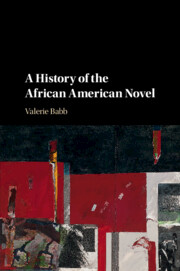Book contents
- Frontmatter
- Dedication
- Epigraph
- Contents
- List of Illustrations
- Acknowledgments
- PART I HISTORY
- Introduction: The Problem with the Title of this Volume
- 1 Out of Many One: The Beginnings of a Novelistic Tradition, 1850s– 1900s
- 2 Publish or Perish: African American Novels, 1900s– 1920s
- 3 Aesthetics of Race and Culture: African American Novels, 1920s– 1940s
- 4 Home of the Brave: African American Novels, 1940s– 1960s
- 5 Black Arts and Beyond: African American Novels, 1960s– 1970s
- 6 From Margin to Center: African American Novels, 1970s– 1990s
- 7 “Bohemian Cult Nats”: African American Novels, 1990s and Beyond
- PART II SIGNIFICANT GENRES OF THE AFRICAN AMERICAN NOVEL
- Coda
- Appendix
- Notes
- Works Cited
- Index
4 - Home of the Brave: African American Novels, 1940s– 1960s
from PART I - HISTORY
Published online by Cambridge University Press: 28 July 2017
- Frontmatter
- Dedication
- Epigraph
- Contents
- List of Illustrations
- Acknowledgments
- PART I HISTORY
- Introduction: The Problem with the Title of this Volume
- 1 Out of Many One: The Beginnings of a Novelistic Tradition, 1850s– 1900s
- 2 Publish or Perish: African American Novels, 1900s– 1920s
- 3 Aesthetics of Race and Culture: African American Novels, 1920s– 1940s
- 4 Home of the Brave: African American Novels, 1940s– 1960s
- 5 Black Arts and Beyond: African American Novels, 1960s– 1970s
- 6 From Margin to Center: African American Novels, 1970s– 1990s
- 7 “Bohemian Cult Nats”: African American Novels, 1990s and Beyond
- PART II SIGNIFICANT GENRES OF THE AFRICAN AMERICAN NOVEL
- Coda
- Appendix
- Notes
- Works Cited
- Index
Summary
Writing from Barcelona, in a letter to Charlotte Osgood Mason, Claude McKay foretold the death of the New Negro Renaissance: “The Negro renaissance movement in America seems a hopeless mess to me. – I cannot help being frank. – If I were in touch with any of the young aspiring Negro artists I'd rather advise them to get as far away as possible from it.” In speaking of the “so-called leaders” of the movement he observes, “They have no real idea of what they want to do – what they can get in an artistic form from this life of the Negro. They were much more interested in the opinions of a few white persons of authority – even though these were lacking in the fine aesthetic spirit of appreciation.” Langston Hughes was the only writer who escaped criticism, because McKay felt he had “big stuff” in him (February 1930, ALP 164-99, 16). In “Recent Negro Fiction,” Ralph Ellison characterized the New Negro fiction of the 1920s and 1930s as “timid of theme” and “technically backward.” For him, the 1940s showed a stronger grasp of American reality, avoiding the precious exoticism of earlier work (my italics, Ellison's term). Ellison reflects a consensus that the 1940s was a repudiation of New Negro ideologies grounded in an over-reliance on white patronage and the preciousness of uniquely primitive black art. His use of the term American is instructive, because though many viewed the 1940s–1960s as ushering in traditions of protest, the period also produced a championing of American sociopolitical structures broadly, while criticizing the denial of blacks a place within these.
Many changes occurred that affected the shaping and emphasis of the novel. For one, coalitions such as the National Negro Congress that brought together civil rights and labor organizations became preferred forums eclipsing salons like the Dark Tower. Organized by John P. Davis, a professor at Howard and presided over by A. Philip Randolph, organizer of the Brotherhood of Sleeping Car Porters, the congress created networking opportunities for writers and thinkers of the 1940s. Richard Wright chaired the panel, “Negro Artists and Writers in the Changing Social Order,” and in attendance were Langston Hughes and Margaret Walker.
- Type
- Chapter
- Information
- A History of the African American Novel , pp. 94 - 123Publisher: Cambridge University PressPrint publication year: 2017



